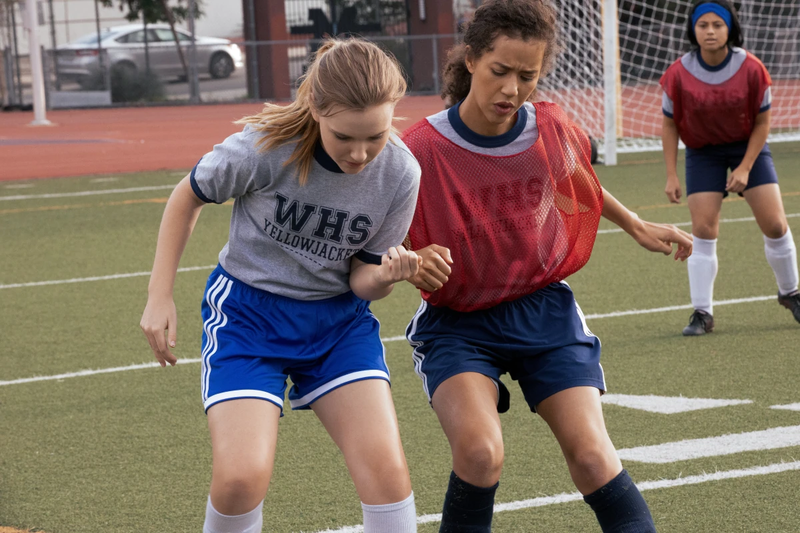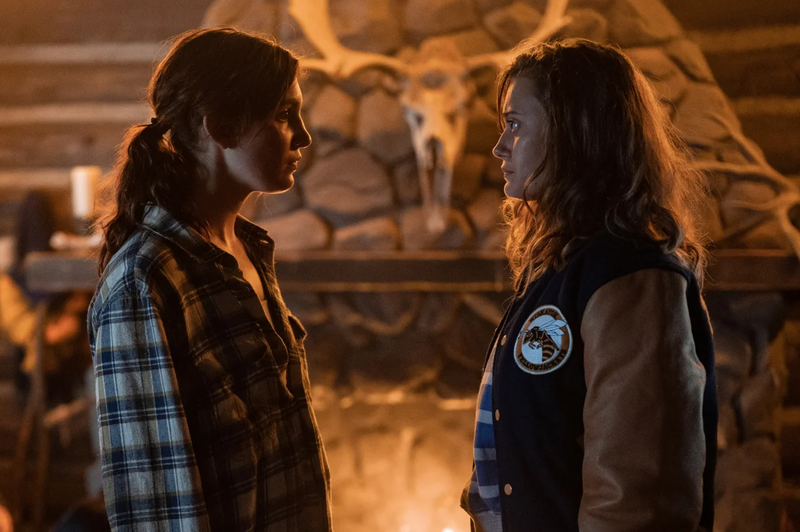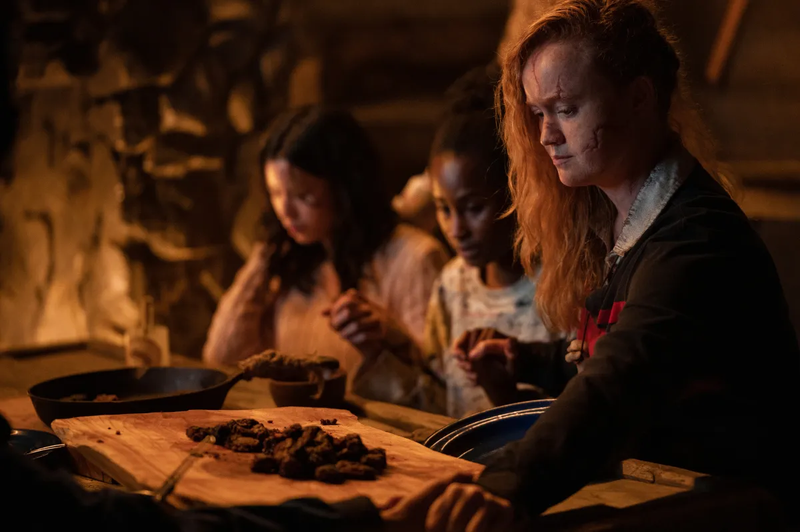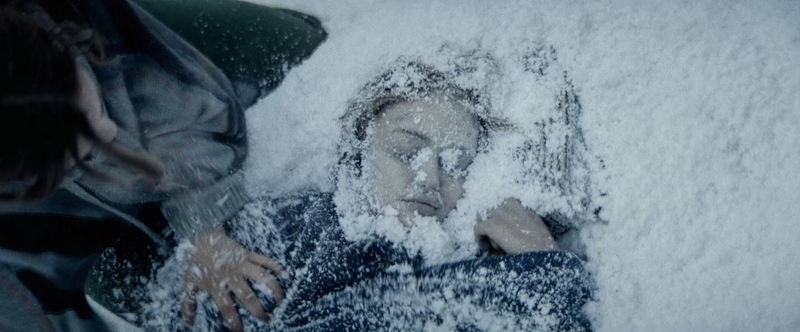Even if none of its characters and/or actors were overtly or openly queer (which is thankfully not the case), Yellowjackets is one of those projects that would still be queer AF precisely because its basic premise is queer AF. A championship girls' high school soccer team crashes in the Canadian wilderness and resorts to cannibalism to survive the nineteen months they're left stranded in the deep dark woods. That part of the story starts in 1996, and we know at least some of them survive because we meet them again in 2021 as adults whose lives are fundamentally structured by silence. No one can ever really know these people because no one can ever know what happened. Some of them are haunted by the versions of themselves they can't unmeet, and some are perhaps too comfortable with the double of themselves: who they became back there, back then, shrouded beneath a respectable public face.
These disparities get at the core question of the series, which is not if they survive or if they eat their friends and teammates- those questions are definitively answered in the pilot episode- but how? What did it take, what stars aligned, and what sequence of events led these girls from Point A (champion athletes, some with Ivy League futures) to Point B (ritual cannibalism)?
The series presents a litany of answers, all of which tend to circle around to the same base point: hunger in all its forms is libidinal in nature, and cannibalism is both the ultimate and most destructive expression of this eroticism.
"Homoerotic cannibalism" is the exact type of terminology prone to being cannibalized, namely because it's a language coined by a queer Black man to describe Black experience. Vincent Woodard's The Delectable Negro: Human Consumption and Homoeroticism Within US Slave Culture explores the explicitly queer eroticism- and explicit, material cannibalism- of the racialized Master/slave dynamic performed during and since chattel slavery was legally enshrined. The term does not solely refer to the queerness inherent in consuming the flesh of another human but is ultimately an analysis of the sacrificial, and Black sacrificiality in particular, as white supremacy's primary form of nutrition.
Woodard illustrates this dynamic using an image from the popular imagination: a white character, usually a damsel, adventurer, or scientist (or Bugs Bunny), encounters a cannibal tribe who captures and attempts to either boil or roast said character over an open flame. Sometimes, the threat of being eaten is preceded or overlaid with the threat of rape. This image could have come to you via Looney Tunes, from '50s horror films (Voodoo Woman), '70s and '80's horror films (Cannibal Holocaust), or, if you've read The Tempest, Heart of Darkness, or Lord of the Flies, from the Western literary canon. It's also the central metaphor of Mean Girls. The tribe bonds- nourishes and enriches itself- through the shared experience of devouring the Other, a consumption that can be expressed figuratively or literally.

Yellowjackets demonstrates both. In the pilot, we watch teenage Taissa (Jasmin Savoy Brown) severely injure a perceived-to-be-underperforming teammate, an act she justifies by characterizing the girl as a "risk" to the team. You could call this determination, but it's also a decided act of ritual sacrifice. Her devotion to winning means all perceived weakness is expendable even before they land in the wilderness, but what is the source of this drive?
A question that remains unanswered, space exists to consider the possibility that her perfectionism and rigor stem from a compulsive need to prove herself not just worthy but indispensable. In episode 7, "No Compass," Taissa attempts to lead part of the team on an expedition south that, needless to say, does not go as planned. Before things get dark, she and her girlfriend, Van (Liv Hewson), engage in ye olde meta "if this were a horror movie" schtick. According to Taissa, "if this was a horror movie, [Lottie would] be the villain," a statement Van responds to with, "if this was a horror movie, you'd be the first to die." Though she claims it's not because Taissa is Black but because she's skeptical, the scene is meant to evoke two specific tropes: the sacrificial negro, who exists in a story for the sole purpose of sacrificing themselves to the development of a white character, and "the Black guy dies first," more so a historical truth than a media trope.
The Delectable Negro is a collected accounting of white cannibalism–the testimonies that contradict the popular image. From the ships whose crews devoured their human cargo, to the Kentucky slaveowner who quartered, roasted, and ate a man for breaking a pitcher to the Donner Party who, as Sherronda J. Brown notes, hunted and ate their Native guides, Salvador and Luis first. History shows that the risk to Taissa and the other Black and non-white characters is categorically heightened. This is demonstrated in the penultimate episode, "Doomcoming," in which Shauna (Sophie Nélisse), Lottie (Courtney Eaton), Akilah (Keeyah King), and Mari (Alexa Barajas) come extraordinarily close to raping, killing, and eating Travis (Kevin Alves).

Now, before we can really do justice to the layers of this scene, we must first address the relationship between Jackie (Ella Purnell) and Shauna, which illustrates the real depth and complexity of a specific flavor of close friendship between girls and women, an equivalent of the homosocial bonding and homosocial desire Eve Kosofsky Sedgwick describes between cishet men. In this dynamic, queerness is expressed through the quandary, do I want to fuck you or be you? Or perhaps more deeply, do I love you or hate you?
As we grow, we construct ourselves much as Dr. Frankenstein constructed his monster: by stitching together the qualities we find attractive (delectable) in others and incorporating those features and characteristics into ourselves. As any chef will tell you, appetite starts first in the eyes, and ultimately, this type of identity formation functions as a specific expression of consumption.
We first meet Jackie as she is- dishonest, prone to people-pleasing, perpetually dissatisfied- then we meet her through Shauna's gaze, where she shines. Like Needy and Jennifer, Shauna can't resist prostrating herself before Jackie, and Jackie can't help feeding on Shauna's devotion while shitting on her every chance she gets. "Remember when you tried to become a Catholic?" teen Jackie scoffs at teen Shauna. "I like the saints," Shauna replies, defensive. "They were all so tragic."
It's the night before the crash and they're getting ready for a party. We see Jackie's casual disdain, her desire to control Shauna, to attempt to determine everything from what she wears to who she should be romantically and sexually involved with. Well-practiced in covert narcissism, Jackie performs a "niceness" meant to shield her core dishonesty and propensity toward manipulation. She stands in judgment, looking down on everyone around her but is, in her own self-image, a martyr and saint incapable of wrongdoing.

But the problem with looking down on (and therefore underestimating) people is that it's functionally a type of self-imposed delusion. Little does Jackie know Shauna was actually fucking her boyfriend, Jeff. Little does Jackie know Shauna is actually pregnant with Jeff's baby. Little does Jackie know Shauna is far closer to Taissa than she is to her. And because we see their marriage decades later, we also know that Shauna's desire for Jeff was actually predicated on his proximity- his belonging- to Jackie.
As in Dracula and Jennifer's Body, Shauna expresses her desire, love, and hatred for Jackie by objectifying Jeff. It's through him that the two girls play out their power struggle. Over time, this evolves into a marriage held together primarily by Shauna and Jeff's experience of loving, betraying, and being haunted by their shared first girlfriend.
In "Doomcoming," Jackie pursues and has sex with Travis, despite his and Nat's mutual feelings for one another. Jackie views Nat (Sophie Thatcher) to be beneath her, and this, combined with a lost will to live (a lost appetite), coalesces into a stunning- albeit predictable- lack of care. What she doesn't realize is that everyone, Travis included, was unknowingly dosed with shrooms courtesy of Misty (Samantha Hanratty). Elsewhere, Lottie is flexing her newfound influence, leading Shauna, Taissa, Van, and some others on what I'm sure we'll come to understand as the group's first hunt. Galvanized by the claim that "he does not belong to her," we come to realize this is not because Lottie sees Travis as "belonging" to Nat but because she sees him as a collective property, sex object, and foodstuff.

All of them tripping, Shauna, Lottie, Akilah, and Mari descend on Travis like Dracula's brides while Van and Taissa disappear elsewhere together (boymeat not being their taste). The scene is intensely feral and terrifyingly erotic; the girls' eyes blackened, their teeth sharpening, kisses becoming bites, sex hunger becoming flesh hunger. When Travis realizes what's happening, he tears out of the cabin, Lottie screaming for them to catch the "stag." During the chase/hunt, the girls stop perceiving Travis as human. Instead, he is now an animal, something to be slaughtered, something sacrificial. Nat and Jackie intervene and save him at the last second. Nevertheless, it's abundantly clear that several boundaries have been transgressed.

Consumption generates the Self through annihilation and incorporation of the Other. To love in action is to edge one's appetite. We must "cage the tiger," that is our desire, our hunger for the beloved, in order to protect them from ourselves. Hatred unleashes said tiger.
In the finale, the erotic tension between Jackie and Shauna explodes. Jackie refuses to allow the shrooms to excuse the previous night's behavior, refuses to engage in the new consumption rituals instituted by Van, Lottie, and Misty, and reveals she knows about Shauna's betrayals. She has not yet realized the influence that protected her back home has long since evaporated, that it's only by Shauna's good graces and their ever-dissipating sense of morality that the other girls have not yet exiled (or devoured) her. In a failed attempt to assert dominance over Shauna, she exiles herself—and quite literally becomes a martyr to the cause of survival.

The thing about love and hate- what can make their discernment tricky- is that they are both practiced and nourished through acts of devotion. Those acts facilitate bonding between individuals, become ritualized and ceremonial, develop ideology, and develop morality; from this brew, religion is born. And there is no form of devotion more queer- or more kinky- than a fetishized devotion to the divine.
In Waiting for God, the Christian mystic Simone Weil describes "the beauty of the world" as "the mouth of a labyrinth." She writes, "if he does not lose courage, if he goes on walking, it is absolutely certain that he will finally arrive at the center of the labyrinth. And there God is waiting to eat him."
Yellowjackets casts the wilderness as that labyrinth, as The Swallowing, but it is also the girls themselves and the vision of God they find in those woods: the hunger alive inside them. That some unknown divinity has devoured them is already evident. The how remains to be seen.






